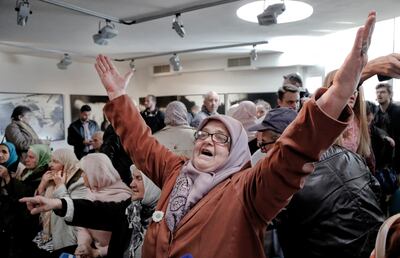Ratko Mladic has been found guilty of genocide and war crimes for atrocities committed during the Bosnian war, including the 1995 massacre of unarmed Muslims at Srebrenica.
Nicknamed the Butcher of Bosnia, the former commander of the Bosnian Serb army was integral in the mass murder, forcible capture, displacement and degradation of thousands of Bosnian Muslims during the 1990s war. He has been sentenced to life in prison.
As he entered the courtroom looking thinner and older than his last public appearance, Mladić smiled and gave a thumbs up to the cameras.
The grimace which replaced his smile for the duration of the hearing betrayed that this was unmistakably the threatening figure who infamously drew his finger across his throat while staring at a mother of one of the thousands killed in Srebrenica on the first day of his trial.
Lawyers for Mladić attempted to delay the hearing saying the 74-year-old was suffering from poor health following a series of strokes.
Shortly after the proceedings turned to focus on Mladić’s personal responsibility for the crimes committed, the hearing paused for Mladić to use the toilet. During the break, Mladić received medical attention to monitor his blood pressure.
In a bizarre face-off, the judge and defence lawyer were unable to agree what the results of the tests were and a terse conversation over whether proceedings should be halted or skipped straight to the judgement was had.
Red-faced, Mladić stood up and began yelling and using his arms to push away the two guards flanking him in the courtroom. He was removed from the court and moved to a side room where he was able to watch the rest of the proceedings through a screen. His defence lawyer was slapped down by the judge after continuing to ask for Mladić’s health to be considered.
UN judges in the Hague on Wednesday found him guilty of ten of the 11 charges. He was charged for two counts of genocide: he was found guilty for genocide in Srebrenica, but was found not guilty for genocide in the other towns and villages.
_______________
Read more
‘Butcher of Bosnia’ faces judgment two decades after alleged war crimes
Dutch state partly responsible for Srebrenica deaths
The ghosts of Sarajevo: a journalist looks back at the enduring tragedy of the Balkan wars
_______________
His charges included war crimes, genocide and crimes against humanity committed during the break-up of the former Yugoslavia in 1990. He was found responsible for the 1995 massacre of almost 8,000 unarmed Muslims at Srebrenica, and for the 44-month siege of Sarajevo, which claimed an estimated 10,000 lives. He was also found guilty of taking UN personnel hostage.
Earlier in the session, when the judge referenced incidents of detainees being forced to rape or commit degrading acts with one another, Mladić shook his head and appeared to let out a small, defensive laugh. The judge went on to outline how children as young as 12 were raped by Mladić’s forces.
The judge said that the aim of Mladić’s forces was to make Srebrenica “disappear” with the intent of forcibly removing the Bosnian Muslim population in order to turn the land into Serbian territory. Many thousands of residents—including children—were removed, never to return again. Healthy men and boys were not abducted, but were beaten and then systematically executed over a period of five days.
Mladić pursed his lips as the judge ruled that the events in Srebrenica constituted forcible transfer, extermination and genocide. He later added that although there was evidence to show the joint criminal enterprise (JCE) intended to permanently remove Bosnian Muslims from Serb-controlled territories, it did not show that genocide was part of the overarching JCE.
As the final verdict is delivered from the the International Criminal Tribunal for the Former Yugoslavia (ICTFY), the victims and survivors of the civil war are one step closer to closure. Mladić is the last of Europe’s high-profile war crime suspects to come under the scrutiny of the Hague.
Hasan Hasanović, a survivor of the Srebrenica genocide, lost his father, twin brother and uncle during their escape. He came under Serbian gunfire while unarmed with his friends and family and reflects: “Their primary concern was that we were Muslim... they wanted us dead”.
Mr Hasanović walked five days, and six nights alongside thousands of Bosniaks attempting to flee to safety 63 miles away in Tuzla. He never discovered what happened to his family and lives in fear that they were tortured and whether they were afforded a quick death.

Mr Hasanović, who has returned and is raising a family in Srebrenica and working at the Memorial Centre, said, “Mladić's verdict is of historical importance to both Bosnia and Herzegovina and to the rest of the world….Unfortunately, the tribunal failed to prove that genocide occurred in other municipalities except for Srebrenica. Victims know that what they survived in Prijedor, Višegrad, Bratunac, Foča, Rogatica, Vlasenica and Zvornik was a genocide in it's conception and that everything culminated with a horrific genocide in Srebrenica”.
Sarajevo-based Rešad Trbonja, who now works with charity Remembering Srebrenica, was only 19 when he was forced to defend his city with a rifle during the Siege of Sarajevo while wearing Converse trainers and his father’s spare overalls.
“Imagine that someone decides to pause your life, life of a city and at the same time, constantly tries to kill anything and everything that lives, walks, breathes in the city. That was exactly what troops under Mladić's command were doing to us,” he explains.
Mr Trobonja believes that Mladić’s sentence “will write history and ensure those not among us any more have a voice in years to come” but that it will not bring back the dead or ease the lose of those who survived.
“I could go on about the siege, about the people killed right next to me, about people decapitated by shrapnel, about hospitals that were running on no supplies, my experiences of donating blood just to get and extra can of beef for my family, but the white tombstones in and around the city marking the resting place of Sarajevans who died too young, who died of Mladić’s hand, tell the story forever”.
Mr Trbonja believes that the only correct outcome would have been for Mladić to be found guilty on all 11 accounts of the indictment. He is pleased Mladić has been put on trial as he feels it is a change for the truth to emerge and in the wake of that for some justice to be served.
A big concern for Mr Tronja is the war criminal’s legacy.
“Whatever the verdict says, Mladić's legacy will remain as a bigger problem in Bosnia and Herzegovina. The fact that he is seen as a hero by vast majority of Serbs in Bosnia and Herzegovina and Serbia. That is something that unfortunately no verdict is going to solve,” he says, adding that he believes throughout the trial Mladić knew he still had huge support from many.
“That actually encouraged him to behave as we used seeing him: [an] arrogant, cold hearted murderer.”.
Caught in 2011 after 16 years on the run, the man blamed for the worst atrocities in Europe since the Nazi era has been the centre of a complex trial lasting 523 days, where almost 10,000 exhibits were admitted in evidence and almost 600 witnesses called. Many shared graphic testimonies, recounting memories of dead bodies and violent attacks.
There have long been accusations from Serbia the ICTY was a "political" institution, which had hampered reconciliation.
Mira Ladak, a 65-year-old grandmother from Belgrade who now resides in London, lost a number of relatives during the war. She says she does not “idealise” Serbia but feels her country has been disproportionately blamed for the events of the civil war.
“I have my doubts about the true impartiality of the Tribunal, set up largely by the countries that were by no means objective bystanders in the conflicts,” says Mrs Ladak, who believes that the international community’s swift recognition of former Yugoslav states declaring independence was the spark to the war’s flame.
“Contrast EU's reaction to the events in Catalonia, to those in ex-Yugoslavia. What do you imagine a hasty recognition of an independent Catalonia would create? It is not unlikely at all that it would result in some degree of violence.”
Sanja Markovic, 39, who is raising her family in England but was in Serbia during the Nato bombing of the country in 1999, reflects on what the trial has meant for Serbs.

“Mladić should be held responsible for his part, but we also want to see other responsible parties also brought in front of justice,” she said.
“What happened in Srebrenica is a tragedy, and responsibility for that lies with international community as well as UN troops. The whole country was in a civil war and all sides did similar crimes, but Srebrenica is the only one that is mentioned in the media… This whole trial is nothing but political charade to perpetuate the story of Serbs being aggressors and others being victims,” she explained, adding, “In the civil war, everyone is the victim”.
Mladić, Radovan Karadžić and former Yugoslav president Slobodan Milošević were among the top leaders, who prosecutors said formed the core of a joint criminal enterprise to create a Greater Serbia.
Milošević died four years into his genocide trial before a verdict could be delivered. Karadžić, the psychiatrist who rose to become the President of Republika Srpska during the Bosnian War, was sentenced to 40 years in jail after being found guilty of genocide, crimes against humanity and breaches of laws or customs of war, Karadzic was sentenced to 40 years in jail.
The verdict comes as tensions have begun once again to simmer in former Yugoslavia. Croatia is publicly mulling over reintroducing conscription next year after abolishing it in 2008.
Despite Croatian Defense Minister Damir Krsticevic denying that his country sees Serbia as a threat, Croatia’s opposition has called it a knee-jerk reaction to Serbia’s acceptance of Russian missiles and increasing military cooperation between the two countries.
Local media reports of a burgeoning civil war between the countries has been dismissed by politicians on both sides.

